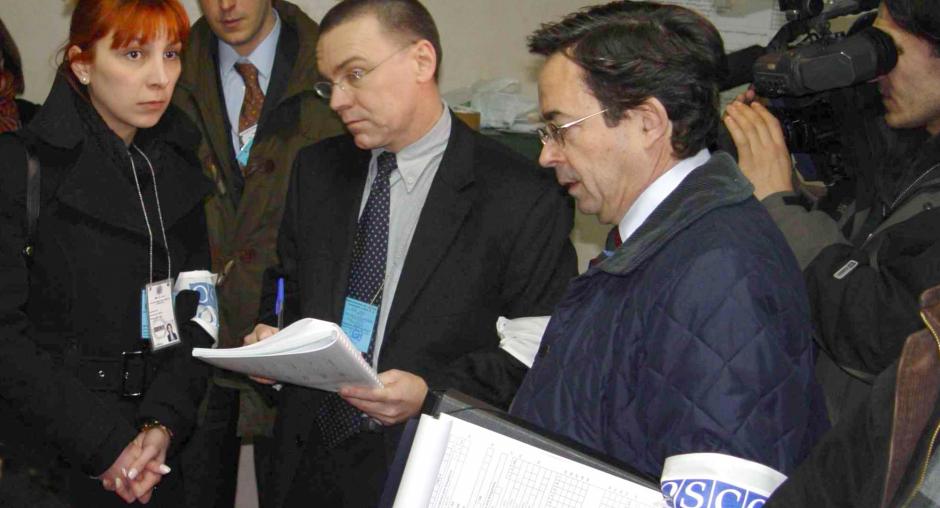Newsroom
Presidential election brings Georgia closer to meeting international standards
TBILISI 5 January 2004

(OSCE)ODIHR Director Christian Strohal (right) and Craig Jenness, Head of the ODIHR Election Observation Mission, at a polling station during Georgia's presidential election, 4 January 2004. (OSCE) Photo details
TBILISI, 5 January 2004 - The 4 January presidential election in Georgia demonstrated notable progress over previous elections in the country but was only a partial test of Georgia's electoral system and commitment to a democratic process, representatives of the International Election Observation Mission (IEOM) said today.
In a press conference during which they presented their preliminary findings and conclusions, Bruce George, President of the Parliamentary Assembly of the OSCE and the Special Co-ordinator for the short-term observers, appointed by the OSCE Chairman-in-Office, said: "Considerable progress has been made over a short period of time. I look forward to returning for the parliamentary elections to witness further steps towards achieving international standards."
"The authorities showed the political will to conduct democratic elections, making a welcome contrast to the deeply flawed 2 November 2003 parliamentary elections," he added.
Matyas Eorsi, who heads the Delegation from the Council of Europe's Parliamentary Assembly, said: "This election brought back hope. The new leadership now has the opportunity, and more importantly the responsibility, to nourish it. Time is short. The forthcoming parliamentary elections will be the true test for the new authorities of their willingness and ability to conduct genuinely democratic elections."
"Election officials at all levels should be recognized for their diligent efforts under difficult and challenging conditions. This election has brought Georgia closer to meeting international standards for democratic elections and closer to Europe," added Demetrio Volcic, Head of the Delegation of the European Parliament.
"We noted clear improvements, particularly in the conduct of voting, new voters lists, the legal framework and overall election administration," concluded Craig Jenness, Head of the Election Observation Mission of the OSCE's Office for Democratic Institutions and Human Rights. "The authorities and the Central Election Commission demonstrated that they were serious about their obligations but there were nevertheless clear concerns. Particularly regarding political imbalance in election administration and failure of some election officials to maintain distance from participants. This was not a truly competitive environment, further progress is needed."
Approximately 450 international observers from 38 countries monitored the election. The International Election Observation Mission's concerns in this election regarded issues such as the continued lack of a clear separation between party and State structures and the political imbalance in the composition of the election administration, in favour of the current authorities. With the exception of the region of Kvemo Kartli, the irregularities reported were on a lesser scale than in the November parliamentary election. The IEOM noted less scrutiny by domestic observers in all aspects of the process.
The lack of commitment by the authorities of Adjara region to guarantee sufficient conditions for the conduct of a meaningful democratic election was also criticized.
In a press conference during which they presented their preliminary findings and conclusions, Bruce George, President of the Parliamentary Assembly of the OSCE and the Special Co-ordinator for the short-term observers, appointed by the OSCE Chairman-in-Office, said: "Considerable progress has been made over a short period of time. I look forward to returning for the parliamentary elections to witness further steps towards achieving international standards."
"The authorities showed the political will to conduct democratic elections, making a welcome contrast to the deeply flawed 2 November 2003 parliamentary elections," he added.
Matyas Eorsi, who heads the Delegation from the Council of Europe's Parliamentary Assembly, said: "This election brought back hope. The new leadership now has the opportunity, and more importantly the responsibility, to nourish it. Time is short. The forthcoming parliamentary elections will be the true test for the new authorities of their willingness and ability to conduct genuinely democratic elections."
"Election officials at all levels should be recognized for their diligent efforts under difficult and challenging conditions. This election has brought Georgia closer to meeting international standards for democratic elections and closer to Europe," added Demetrio Volcic, Head of the Delegation of the European Parliament.
"We noted clear improvements, particularly in the conduct of voting, new voters lists, the legal framework and overall election administration," concluded Craig Jenness, Head of the Election Observation Mission of the OSCE's Office for Democratic Institutions and Human Rights. "The authorities and the Central Election Commission demonstrated that they were serious about their obligations but there were nevertheless clear concerns. Particularly regarding political imbalance in election administration and failure of some election officials to maintain distance from participants. This was not a truly competitive environment, further progress is needed."
Approximately 450 international observers from 38 countries monitored the election. The International Election Observation Mission's concerns in this election regarded issues such as the continued lack of a clear separation between party and State structures and the political imbalance in the composition of the election administration, in favour of the current authorities. With the exception of the region of Kvemo Kartli, the irregularities reported were on a lesser scale than in the November parliamentary election. The IEOM noted less scrutiny by domestic observers in all aspects of the process.
The lack of commitment by the authorities of Adjara region to guarantee sufficient conditions for the conduct of a meaningful democratic election was also criticized.
